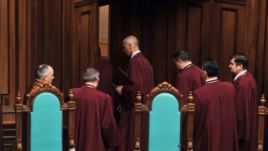Constitutional Carte Blanche for Corruption and Censorship

Ukraine’s Constitutional Court (Photo from Radio Svoboda)
Ukraine’s Constitutional Court has passed a real gem of a judgement – one of inestimable value to corrupt officials precisely because that value need now never be disclosed.
The judgement in question, dated 20 January 2012 and made public on Tuesday effectively prohibits disclosure of any information about a public official or politician and / or their families, including about their financial circumstances, without their consent.
The judgement (interpreting Articles 32 § 1 and 34 § 3 of the Constitution defines confidential information. This, it states, is “information about the personal or family life of a person and / or data about their property or non-property relations, circumstances, events, relations etc, linked with the person and members of their family, with the exception of information envisaged by law, concerning the use of official powers by a person holding a post linked with carrying out state functions or bodies of local self-government”. Its list, incidentally, is not exhaustive, making attempts to foresee likely prohibitions even more difficult. Any gathering, use or circulation of this confidential information without their consent shall be considered intrusion into their personal and family life. “Such intrusion is permitted solely in cases set out in law, and only in the interests of national security, economic prosperity and human rights”.
As with the highly dangerous Personal Data Protection Act adopted despite strong protest from human rights, media and business organizations and in effect since the beginning of 2011, the judgement is full of references to international conventions, etc. In fact, it flies in the face of European Court of Human Rights case law and good practice on fighting corruption.
Since the Constitutional Court’s judgement is final, and the Constitution has the highest legal force in the country, other laws may be amended, including the law demanding that income declarations be submitted not only by public officials, but also members of their family. This is widely recognized as a vital element in fighting corruption. The Court’s judgement, however, can probably now be cited by relatives as grounds for not providing the declaration.
More importantly, journalists who choose to investigate the often flagrant discrepancies between official declarations and the actual circumstances in which officials and their families live have now effectively been silenced. Journalists who, for example, presented grounds for disbelieving the extraordinary modest amounts given on the declarations of Kharkiv’s Governor and Mayor could conceivably face anything from a substantial fine to a term of imprisonment of up to 3 years. The possible sentence for a repeat “offence” is up to 5 years.
It could, and probably should, be argued that divulgence of a lot of the information now hidden by the Constitutional Court magic wand from the public is “in the interests of economic prosperity and / or human rights”. Lack of transparency and openness leads to corruption and therefore hampers economic development, while in no way serving the cause of equal rights, fair court proceedings and other fundamental rights. In today’s political climate, the chances of convincing a court of this in Ukraine are remote. They are considerably higher in the European Court of Human Rights but that takes time and effort, and the brutal truth is that many journalists are much more likely to remain silent and avoid trouble.
The clear advantage to informing the public of dodgy tenders, secret deals or of officials living it up at the taxpayers’ expense, etc hardly needs to be spelled out. On the same day that the judgement was announced, Ukrainska Pravda published details of a response from the President’s Administration to their information request. The President’s staff cited the Personal Data Protection Act as grounds for not revealing which public officials living in the luxurious government residential areas “Koncha-Zaspa” and “Pushcha-Volchytsa” receive substantial rebates on communal charges. They did however divulge that 50 million UAH is envisaged in the 2012 budget just for upkeep of these areas.
Since the same Constitutional Court saw fit recently to declare as constitutional a law allowing the Cabinet of Ministers to override existing laws and determine the size of many social payments depending on available funds, it is perhaps not surprising that members of the government do not wish the public to know about benefits they have no wish to renounce.
It is much more disturbing that the Constitutional Court is passing judgements which may please those currently in power but which place freedom of speech, the right to information and any measures to combat corruption in jeopardy.





